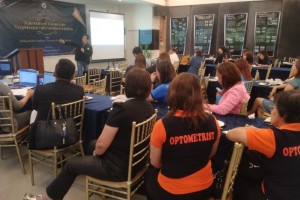The Department of Education Schools Division of General Santos (DepEd GenSan) encouraged the active involvement of stakeholders in meeting students’ educational demands and most basic needs, bringing public-private partnership to the highest level.
Acknowledging that the field of education demands a delicate balance of patience, persistence, and effective public relations, DepEdGensan, through its Social Mobilization and Networking (SMN) section, launched an online format dubbed the “School Needs Data System” (SNDS) in 2018.

Herven Allado, DepEd Gensan's senior program specialist for the SMN section, said that since its launch in 2018, the SNDS website (www.sndsgensan.com) has continuously gained the support of the public and has significantly contributed to educational funding, securing more than 60 million pesos annually for 116 schools in General Santos City.
Notably, during the peak of the COVID-19 pandemic, the system generated over P178 million in total support for the school year 2020–2021.
Allado described it as the first web-based platform in Region 12 that is poised to facilitate effective and efficient partnership engagement with prospective stakeholders who are willing to provide assistance to schools.
The SNDS also aims to transform the usual partnership practice within the Division. It also strives to promote DepEd’s core values while nurturing a culture of effective collaboration.
"At the national level, we were taught this approach in engaging stakeholders: just identify your needs, map your stakeholders, and then match the needs to your stakeholders. Gano’n, three steps. Parang simple lang [That's it.Just three simple steps], but it’s so hard to do that," he said.
Allado also noted that while there are individuals who naturally possess the skill of forming partnerships and effortlessly engaging their communities in meeting educational needs, others encounter considerable challenges in this field.
Based on research, there are complexities in forging partnerships within the academic setup. These challenges include finding committed stakeholders, aligning partners with identified needs, monitoring accomplishments, providing updated school data, allocating resources effectively, and sustaining vital partnerships.
Meanwhile, Allado also acknowledged that DepEd faces additional challenges that could impact educational service delivery. He identified these obstacles as limited data on school needs, difficulties in monitoring program implementation due to a lack of collaboration, and the need to instill a shared sense of responsibility for education among stakeholders.
Other concerns include non-adherence to partnership protocols, schools failing to achieve their Annual Implementation Plan (AIP) targets, stakeholders offering support without considering actual needs, and inadequate monitoring of supported programs.
Allado explained that these factors prompted the development of SNDS, aimed at effectively tackling the immediate challenges within the Division. He said that his primary inspiration for the creation of SNDS stemmed from witnessing the struggles encountered by school partnership focal persons (SPFPs) during their visits to schools.
He further explained that another driving force behind SNDS was to dispel the unfavorable image of SPFPs being viewed as "professional beggars" who constantly solicit for school projects. Allado emphasized that the system was developed to empower them as advocates, fostering assistance for the benefit of learners.
"Professional beggars, napakasakit pakinggan [it’s very painful to hear], but in reality we are reaching for support from the partners for the learners. We are not professional beggars, but we are promoters of values," he pointed out.
The SNDS allows stakeholders to access school needs data, monitor the progress of projects, and engage with schools online, which then strengthens continuous improvement and sustainable partnerships.

The web-based SNDS operates through three major phases: Pre-engagement, Engagement, and Post-Engagement. During the pre-engagement phase, school heads and SPFPs encode AIP-based needs into the system. The engagement phase, on the other hand, involves the stakeholders selecting specific needs from various packages in the SNDS, ranging from infrastructure and technology to health and nutrition support, to adopt or sponsor.
The post-engagement phase includes the system's evaluation phase, which deals with the continuing improvement of implemented programs, projects, and activities, enhancing collaboration between parties involved and other stakeholders. The e-docs validation which is the final phase, ensures the authenticity of electronic documents, with stakeholders and the Division validating project completion.
Assistance may come in kind or in cash, Allado said, pointing out the best features of the online information platform.
“If you are a donor of a classroom, kahitnasa Manila ka, mamo-monitor mo kung anong percent naangnatapos ng atingprograma. [Even if you are in Manila, you can monitor the percentage of the program completion],” he said.

Despite the success of SNDS, it encounters difficulties related to website maintenance and cloud storage. To ensure its sustainability, Allado is actively pursuing fund support from various sources, including the SangguniangPanlungsod (SP) of General Santos. In his privilege speech during the SP’s 39th regular session on July 11, Committee on Information Technology chairperson City Councilor Richard Atendido expressed his support for the sustainability of the program.
"The implementation of data systems in schools is not a luxury but a necessity. These systems expedite administrative tasks, enable personalized learning experiences, and facilitate informed decision-making. Thus, it is time to acknowledge the disparities that exist and take proactive steps to bridge the gap," he said.
With the intention of enhancing the SNDS, Allado envisions rendering it more user-friendly and augmenting its features. This would enable DepEd divisions in other regions to adopt and replicate the system, thereby facilitating schools in delivering an improved educational experience for all their students.
He urged stakeholders to continue their contributions as he cited the importance of strengthening partnerships to achieve long-term success with Parents-Teachers Associations, non-government organizations, local government units, school-based canteens, and other philanthropic institutions.
“You give us the bullet, and we will go to war. DepEd is responsible for delivering quality education to the learners, and with your support we can do that. Napakalakas ng spirit of bayanihan dito sa Gensan,” Allado said, recognizing the spirit of ‘bayanihan,’ a tradition of collective effort and cooperation that thrives among the people in General Santos. (HJPF – PIA SarGen)



